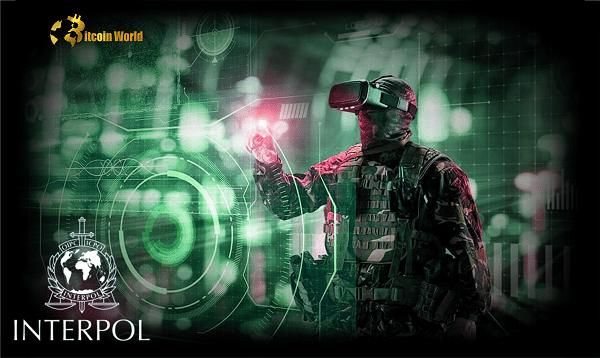In a move that sounds straight out of a sci-fi thriller, but is very much real, Interpol – the global police organization – has officially stepped into the metaverse. Why? To fight crime, of course! And the timing couldn’t be more relevant, especially with the ongoing saga of Do Kwon, the Terraform Labs co-founder who’s currently playing hide-and-seek with international authorities. Let’s dive into how Interpol is planning to police the virtual world and what it means for the future of law enforcement.
Why is Interpol Building a Metaverse? The Do Kwon Connection
Think about it: as our lives increasingly blend into digital spaces, so does crime. And just like criminals don’t respect physical borders, they certainly won’t be confined by the boundaries of the metaverse. Interpol’s metaverse launch isn’t just a tech experiment; it’s a proactive step to address the evolving landscape of crime. The organization itself states this is the “first ever metaverse specifically created for law enforcement globally.”
The timing of this launch, coinciding with the international manhunt for Do Kwon, adds another layer of intrigue. Kwon, wanted in connection with the Terra Luna crypto crash, reportedly hopped from Singapore to Dubai and possibly beyond, highlighting the challenges of tracking individuals in a globalized world. Could a metaverse presence help in such situations? Interpol seems to think so.
Inside Interpol’s Metaverse: What Can It Do?
Launched at the 90th Interpol General Assembly in New Delhi, this metaverse is already “completely operational.” Imagine a virtual world where law enforcement can:
- Train for Real-World Scenarios: Interpol’s promotional video showcases a virtual crime scene training facility. This allows officers to hone their skills in a safe, repeatable, and highly realistic environment. Think of it as a sophisticated, global police academy accessible from anywhere.
- Simulate Border Control: A virtual immigration and border control checkpoint is another featured application. This could be used to train officers on identifying fraudulent documents, managing crowds, and even practicing de-escalation techniques in high-pressure situations – all within the metaverse.
- Conduct Virtual Visits: Delegates at the General Assembly were able to virtually visit a rendering of Interpol’s General Secretariat headquarters in Lyon. This opens doors for remote collaboration, meetings, and even virtual crime scene walkthroughs across geographical barriers.
👮♀️👮♂️🌍 Entering the Metaverse to protect our communities in the virtual world. #INTERPOLGA is launching a Metaverse to train officers and help fight crime in the virtual world.
➡️ https://t.co/eS7Pz9PzDw pic.twitter.com/0RzInCzj71
— INTERPOL (@INTERPOL_HQ) October 20, 2022
Securing the Virtual Frontier: The Expert Group on the Metaverse
Interpol isn’t just jumping into the metaverse blindly. They are establishing an “Expert Group on the Metaverse” to proactively address the security challenges that come with this new virtual world. This group will focus on ensuring the metaverse is “secure by design,” reflecting law enforcement’s concerns on a global scale. This is crucial because, without proper safeguards, the metaverse could easily become a breeding ground for new forms of crime.
Web3 and Law Enforcement: A Growing Trend
While Interpol’s metaverse is a significant step, they aren’t the first law enforcement agency to explore Web3 technologies. Earlier in October, Indian police in Firozabad launched a Web3-powered online complaint portal. This demonstrates a growing trend of law enforcement agencies recognizing the potential of decentralized technologies for their operations.
The Do Kwon Manhunt and Interpol’s Red Notice
The backdrop to all of this is Interpol’s ongoing search for Do Kwon. They’ve issued a red notice – essentially a global alert – requesting international law enforcement to locate and temporarily detain him. This red notice underscores the seriousness of the charges against Kwon and Interpol’s commitment to bringing him to justice.
Despite the red notice and accusations from South Korean prosecutors, Do Kwon has publicly refuted claims that he is on the run. He maintains his innocence, but the international law enforcement community is clearly taking the matter very seriously.
Challenges and the Road Ahead
Interpol’s metaverse is undoubtedly a groundbreaking initiative, but it’s not without its challenges. Some key questions and potential hurdles include:
- Jurisdiction: Policing in the metaverse raises complex jurisdictional questions. Who has authority when a crime is committed in a virtual space that transcends physical borders?
- Data Privacy: Collecting and using data within the metaverse must be done responsibly and ethically, respecting privacy concerns.
- Accessibility and Training: Ensuring all member countries have the resources and training to effectively utilize the metaverse tools will be crucial for its global impact.
- Evolving Criminal Tactics: As law enforcement adapts to the metaverse, criminals will likely adapt their tactics as well, leading to a continuous cat-and-mouse game.
Conclusion: A New Era of Global Policing?
Interpol’s metaverse marks a significant step towards adapting law enforcement for the digital age. By creating a virtual space for training, collaboration, and simulation, Interpol is proactively preparing for the future of crime. While challenges remain, this initiative signals a clear recognition that the fight against crime is no longer confined to the physical world. As we spend more time in virtual environments, law enforcement must follow, and Interpol is taking the lead in this exciting and crucial new frontier. The chase for individuals like Do Kwon in the real world might just get a high-tech boost from the virtual one.
Disclaimer: The information provided is not trading advice, Bitcoinworld.co.in holds no liability for any investments made based on the information provided on this page. We strongly recommend independent research and/or consultation with a qualified professional before making any investment decisions.


